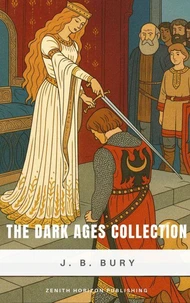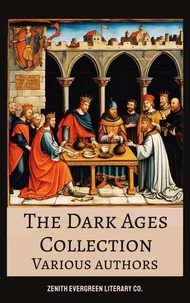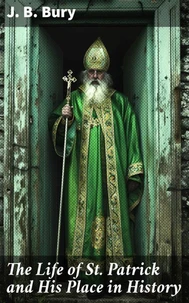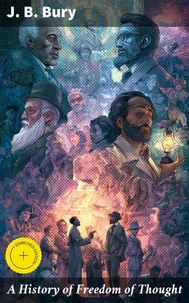History of the Freedom of Thought
Par :Formats :
Disponible dans votre compte client Decitre ou Furet du Nord dès validation de votre commande. Le format ePub est :
- Compatible avec une lecture sur My Vivlio (smartphone, tablette, ordinateur)
- Compatible avec une lecture sur liseuses Vivlio
- Pour les liseuses autres que Vivlio, vous devez utiliser le logiciel Adobe Digital Edition. Non compatible avec la lecture sur les liseuses Kindle, Remarkable et Sony
 , qui est-ce ?
, qui est-ce ?Notre partenaire de plateforme de lecture numérique où vous retrouverez l'ensemble de vos ebooks gratuitement
Pour en savoir plus sur nos ebooks, consultez notre aide en ligne ici
- Nombre de pages132
- FormatePub
- ISBN859-65--4739806-6
- EAN8596547398066
- Date de parution13/11/2022
- Protection num.Digital Watermarking
- Taille278 Ko
- Infos supplémentairesepub
- ÉditeurDIGICAT
Résumé
In "History of the Freedom of Thought, " J. B. Bury presents a profound exploration of the evolution of intellectual liberty from antiquity to the modern age. Bury's scholarly narrative is rich in historical context, weaving together philosophical discourse and political developments that have shaped the landscape of free thought. His literary style combines meticulous analysis with engaging prose, making complex ideas accessible while demonstrating their significance in the fabric of societal progress.
Bury challenges readers to reflect on the implications of freedom of thought in a world where intellectual curiosity often encounters resistance. J. B. Bury, a renowned historian and philosopher, is well-regarded for his insights into the development of intellectual thought. His academic background, steeped in the classics and philosophical inquiry, profoundly influenced his pursuit of this topic.
Bury's scholarship was propelled by the growing need to understand the interplay between freedom and authority, particularly in a society facing increasing ideological restraints at the time of his writing. This seminal work is essential for anyone interested in philosophy, history, or the evolution of human rights. Bury's compelling analysis not only provides historical perspective but also encourages contemporary readers to appreciate the value of intellectual freedom in today's complex world.
Bury challenges readers to reflect on the implications of freedom of thought in a world where intellectual curiosity often encounters resistance. J. B. Bury, a renowned historian and philosopher, is well-regarded for his insights into the development of intellectual thought. His academic background, steeped in the classics and philosophical inquiry, profoundly influenced his pursuit of this topic.
Bury's scholarship was propelled by the growing need to understand the interplay between freedom and authority, particularly in a society facing increasing ideological restraints at the time of his writing. This seminal work is essential for anyone interested in philosophy, history, or the evolution of human rights. Bury's compelling analysis not only provides historical perspective but also encourages contemporary readers to appreciate the value of intellectual freedom in today's complex world.
In "History of the Freedom of Thought, " J. B. Bury presents a profound exploration of the evolution of intellectual liberty from antiquity to the modern age. Bury's scholarly narrative is rich in historical context, weaving together philosophical discourse and political developments that have shaped the landscape of free thought. His literary style combines meticulous analysis with engaging prose, making complex ideas accessible while demonstrating their significance in the fabric of societal progress.
Bury challenges readers to reflect on the implications of freedom of thought in a world where intellectual curiosity often encounters resistance. J. B. Bury, a renowned historian and philosopher, is well-regarded for his insights into the development of intellectual thought. His academic background, steeped in the classics and philosophical inquiry, profoundly influenced his pursuit of this topic.
Bury's scholarship was propelled by the growing need to understand the interplay between freedom and authority, particularly in a society facing increasing ideological restraints at the time of his writing. This seminal work is essential for anyone interested in philosophy, history, or the evolution of human rights. Bury's compelling analysis not only provides historical perspective but also encourages contemporary readers to appreciate the value of intellectual freedom in today's complex world.
Bury challenges readers to reflect on the implications of freedom of thought in a world where intellectual curiosity often encounters resistance. J. B. Bury, a renowned historian and philosopher, is well-regarded for his insights into the development of intellectual thought. His academic background, steeped in the classics and philosophical inquiry, profoundly influenced his pursuit of this topic.
Bury's scholarship was propelled by the growing need to understand the interplay between freedom and authority, particularly in a society facing increasing ideological restraints at the time of his writing. This seminal work is essential for anyone interested in philosophy, history, or the evolution of human rights. Bury's compelling analysis not only provides historical perspective but also encourages contemporary readers to appreciate the value of intellectual freedom in today's complex world.










